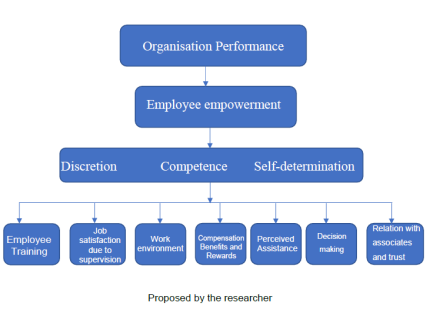
By Dr Nadia Liaquat, Business Lecturer at FSB Croydon, Article Date, 13/05/2024
A successful organisation relies on more than just skilled employees – it needs an empowered workforce, especially in the healthcare sector, where employee engagement directly impacts patient care. In my latest study at the University of West Scotland, I explored Ziauddin Hospital in Pakistan, where a focus on employee empowerment led to significant improvements in organisational performance. Empowerment, in this context, involves giving employees more autonomy and a voice in decision-making. The research revealed that when staff feel valued and have a say in how they work, morale increases and outcomes improve. This blog will discuss how Ziauddin Hospital’s approach can serve as a blueprint for other organisations looking to foster a positive and successful workplace culture.
Empower to Excel
Employee empowerment has emerged as a crucial tool in Human Resources, fostering a sense of ownership and belonging among employees. By empowering employees, organisations can cultivate a workplace where individuals feel comfortable, confident, and valued, ultimately leading to improved quality of service and enhanced organisational performance. This concept was the focus of my study, where I examined the impact of employee empowerment on employee performance and overall organisational success in Ziauddin Hospital, Pakistan.
For this study, I analysed various departments within Ziauddin Hospital, exploring the influence of employee empowerment on different aspects of organisational performance, including employee satisfaction and quality of service. This hospital setting provided a unique opportunity to delve into an area with limited published research and to understand how empowerment strategies could be effectively implemented in a complex environment like healthcare.
The concept of employee empowerment has been defined from various perspectives in academic literature. Conger and Kanungo (1988) describe empowerment as a process designed to increase workers’ self-awareness and self-efficacy at all levels within a company. Similarly, Bateman and Snell (2014) view empowerment as a technique that grants authority and power to employees, allowing them to make decisions that influence their work and the broader organisation. Jha (2013) suggests empowerment contributes to a sense of self-efficacy by addressing situations that foster feelings of failure and powerlessness.
In this academic blog, I aim to discuss how these different interpretations of empowerment converge and the specific ways in which they can be applied within a healthcare context. My research at Ziauddin Hospital serving as a case study, illustrates how empowerment can transform an organisation and enhance its performance through improved employee satisfaction and engagement. Through a deeper understanding of these dynamics, we can identify best practices that support both employee and organisational growth.
Rational of the research study

The global economy has grown substantially, driven by the competitive nature of modern organisations. Competition compels companies to devise innovative strategies for sustainable growth, focusing on key factors like employee empowerment, satisfaction, involvement, and productivity (Timothy & Abubakar, 2013). Organisational success and goal achievement often hinge on the implementation of these strategies, with a strong correlation between employee satisfaction and company growth (Dahou & Hacini, 2018).
However, a lack of job satisfaction can lead to reduced productivity and poor work performance, threatening the development of business structures. This underscores the importance of employees and employers understanding their roles, accomplishments, and targets. In Pakistan, private hospitals like Aga Khan Hospital and Al-Shifa International Hospital have excelled in providing high-quality care without compromising their standards. Their customer satisfaction and loyalty are largely a result of the efforts and dedication of empowered employees.
The focus of this research is a critical analysis of employee empowerment and its impact on organisational performance in Pakistan. By exploring the key factors that contribute to effective empowerment, we can better understand how it influences employee morale and ultimately drives organisational success. Through a comprehensive study of employee empowerment, this research aims to shed light on practices that can enhance productivity and foster a culture of continuous improvement in Pakistani organisations.
Significance and overview of the research
This study employed a mixed-methods approach for data collection, targeting both management and employees within the organisation. By using a combination of quantitative and qualitative techniques, the research provided a more comprehensive and nuanced understanding of the subject matter. This approach, known as triangulation, allows researchers to study a phenomenon from multiple angles, thereby increasing the robustness and credibility of the findings (Downward et al., 2005).
Triangulation involves integrating different methods, theories, techniques, or sources of research data to examine a common theme. The advantage of combining qualitative and quantitative methods is that it can offset the limitations inherent in each approach when used separately. Quantitative data provides measurable, objective insights, while qualitative data offers depth and context, enabling a richer interpretation of the results. This dual approach strengthens the reliability and validity of the study by providing a more holistic view of the research question.
Employee Empowerment Model

Conclusion
The primary aim of my research was to explore how employee empowerment contributes to job satisfaction, ultimately enhancing organisational performance. The study focused on understanding the importance of empowerment and identifying the most effective strategies to improve employee productivity, thus bolstering the organisation’s overall success. The findings suggest that these insights could be instrumental in refining the work environment at Ziauddin Hospital in Pakistan, leading to improved employee performance and establishing a more effective management system through the implementation of innovative programmes.
While the significance of employee empowerment is widely acknowledged, our findings at Ziauddin Hospital reveal a discrepancy between theory and practice. Employees often lack the autonomy needed to address challenges independently, indicating a need for systemic shifts in the hospital’s management approach. Empowered employees are more proactive, display critical thinking, and show greater commitment to their roles, which in turn benefits patient outcomes and strengthens the organisation’s resilience.
As Ziauddin Hospital progresses on its journey of organisational development, the insights from this study offer a blueprint for reimagining the healthcare management landscape. These findings have implications not only for Ziauddin Hospital but for healthcare institutions worldwide, reinforcing the idea that when employees are empowered, the entire organisation thrives. We invite you to join the conversation and help us redefine what it means to empower employees in healthcare.
References
Bateman, T.S. and Snell, S. (2014). Management: leading and collaborating in the competitive world. New York: McGraw-Hill Higher Education; London.
Conger, J & Kanungo, R, (1988), ‘The Empowerment Process: Integrating Theory and Practice’, Academy of Management Review, vol.13.
Dahou, K. And Hacini, I. (2018 b). Successful Employee Empowerment: Major Determinants in the Jordanian Context. Eurasian Journal of Business and Economics,11(21), pp. 49–68.
Downward, P. and Mearman, A., (2005). Methodological triangulation at the Bank of England: An investigation, Discussion Paper 505. University of the West of
England press, Bristol School of Economics., [online]. Available from https://www.researchgate.net/publication/23697582_Methodological_Triangulation_at_the_Bank_of_England an Investigation [Accessed 15 March 2019].
Jha, S., (2013). Managerial practices, transformational leadership, customer satisfaction and self-efficacy as antecedents of psychological empowerment.
Journal of Management Research, 13 (2), pp. 105-117.
Timothy, A. T. and Abubakar, H. S. (2013). “Impact of Employee Empowerment on Service Quality: An Empirical Analysis of the Nigerian Banking Industry.” British Journal of Marketing Studies, 1(4), 32–40.
